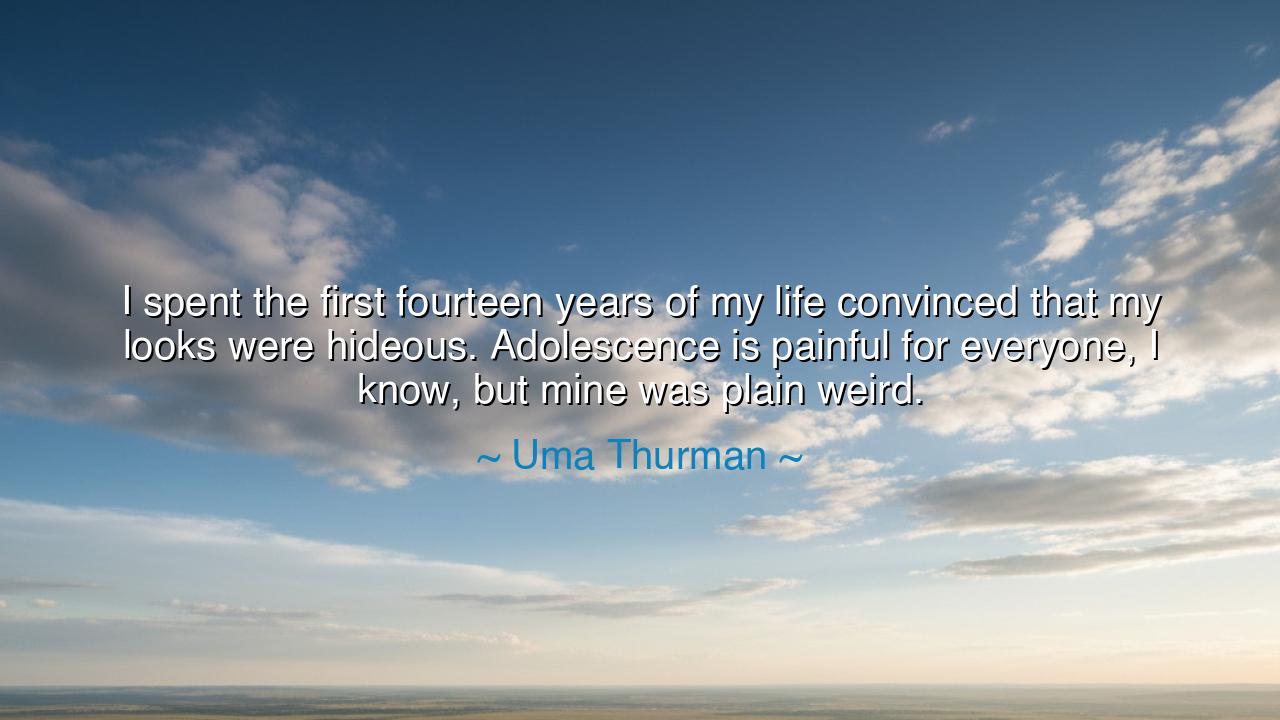
I spent the first fourteen years of my life convinced that my
I spent the first fourteen years of my life convinced that my looks were hideous. Adolescence is painful for everyone, I know, but mine was plain weird.






Hearken, O seekers of reflection, and heed the words of Uma Thurman, who speaks with the raw candor of experience: “I spent the first fourteen years of my life convinced that my looks were hideous. Adolescence is painful for everyone, I know, but mine was plain weird.” In these words lies a meditation upon the fragility of self-perception, the trials of growing into one’s own skin, and the universal struggle to reconcile inner reality with outward appearances. Thurman reminds us that youth is a time of intense vulnerability, where the mirror of the world often distorts the vision of the self.
The pain of adolescence that Thurman recounts is a crucible familiar to all, yet uniquely experienced by each soul. In these years, the spirit wrestles with identity, desirability, and belonging, often confronting the disparity between how one feels and how one is perceived. Thurman’s confession—feeling hideous despite her later celebrated beauty—reveals the deep chasm between internal judgment and external truth, a reminder that self-doubt is an ancient companion to youthful growth.
Her phrase “plain weird” illuminates the peculiar alchemy of adolescence: the body transforms, emotions surge, and social codes shift with bewildering rapidity. Thurman’s experience reflects the timeless human condition: to stand on the threshold of adulthood is to face a world both familiar and strange, where self-consciousness magnifies difference and renders the ordinary extraordinary. In this, we see the eternal lesson that strangeness and uncertainty are inherent in the formation of self.
Consider the story of the poet Emily Dickinson, who as a girl felt out of place in her own world, often described as awkward or unusual by her peers. Yet in this sense of difference, she discovered her voice, her vision, and the capacity to see beyond the ordinary. Thurman’s reflection mirrors this truth: periods of feeling “weird” or misaligned” may ultimately be the fertile ground from which authenticity, creativity, and insight grow.
Thurman’s admission also underscores the universality of adolescent insecurity. While each experience is unique, all who pass through these years encounter moments of self-doubt, moments in which the mirror seems unkind and the world unwelcoming. To recognize the shared nature of adolescent pain is to cultivate empathy—for oneself and for others—revealing that these years, though turbulent, are a rite of passage that shapes the human spirit.
From her reflection emerges a lesson of profound clarity: the judgments of youth, particularly about appearance and identity, are rarely final. Thurman’s journey reminds us that beauty, worth, and confidence are not fixed by fleeting perception but are cultivated over time through acceptance, self-awareness, and growth. The very strangeness and insecurity felt in adolescence may be the seeds of future strength, resilience, and self-expression.
Practically, one may embrace this wisdom by fostering self-compassion, reflection, and acceptance during formative years. Encourage young people to explore their identities, to express their unique qualities, and to recognize that difference is not flaw, but potential. Guide them to understand that periods of feeling “weird” or uncomfortable are natural, transient, and often transformative, shaping the character and depth that endure throughout life.
Thus, let the words of Uma Thurman resound across generations: adolescence may be painful, bewildering, and fraught with self-doubt, yet these trials are neither shameful nor meaningless. In embracing the strangeness, surviving the pain, and cultivating understanding, the youth emerges not merely older, but wiser, stronger, and more attuned to the beauty of individuality. In this journey lies the eternal truth: the trials of growing up, though unsettling, are the forge of identity, resilience, and self-discovery.






AAdministratorAdministrator
Welcome, honored guests. Please leave a comment, we will respond soon